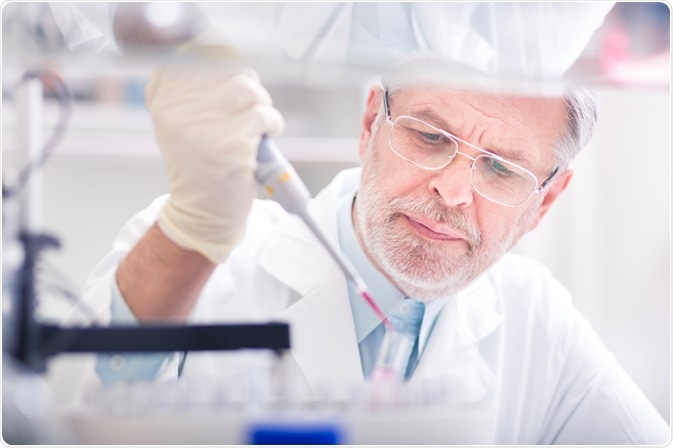A more humane approach to research

Image Credit: Matej Kastelic/Shutterstock.com
The use of animals in research came about as scientists tried to understand the disease process and find ways of treating or curing diseases. While this gave rise to the medications we have today, ethical questions remain when it comes to the use of animals in research.
“The 3Rs” is an initiative that aims to make the use of animals in research more humane, by “Replacement, Reduction, and Refinement”. This is a framework that was set up over 50 years ago and looks at ways in which animals can be replaced, the numbers used reduced, and the welfare of animals that must be used improved so that suffering is minimized as much as possible (refined). There is another “R” which should be considered, “Rehabilitation” of animals after the research is finished.
“Replace” – can animal cells be used instead?
One alternative to using animals is to use animal cell lines. These are in vitro systems based on growing cells from a donor. Cell lines are generally cells that are established and have the potential to continuously grow.
These cell lines have been used for many purposes, from making monoclonal antibodies to evaluating potential liver toxicity. For example, before a new compound is tested in animals, a cell line derived from liver cells can be used to see if the compound is toxic.
Therefore, this means that highly toxic compounds can be screened out of a drug discovery program before animal studies are carried out. Below are two examples of studies that made use of cell lines.
Example 1: antioxidant activity of ceria-HMTA
Oxidative stress is the process whereby the levels of free radicals and other highly reactive molecules in a system rise. This can, in turn, lead to disruption of the normal physiological function of the tissues affected, and then lead to diseases such as rheumatoid arthritis, diabetes, cancer, and other inflammatory conditions.
Hydrogen peroxide has been linked to many human diseases, and so the ability to measure and control levels of hydrogen peroxide could be beneficial to disease management.
Nanoceria, nanoparticles made from cerium oxide (ceria), can remove free radicals while having the ability to “regenerate” in certain conditions. During the formation of ceria, oxygen vacancies are created, allowing constituent Ce atoms to exist in the +3 and +4 states. This, in turn, allows ceria to act as a catalyst both in industry and in biological systems.
The study by Ujjain and co. created a nanoparticle derived from nanoceria, CeO2-HMTA. To see if CeO2-HMTA could remove free radicals, the authors used an H9c2 cell line. These H9c2 cells are rat heart cells.
Oxidative stress was induced in H9c2 cells using hydrogen peroxide, and the authors demonstrated that CeO2-HMTA could reduce the induction of oxidative stress; the production of reactive oxygen species was lower in cells treated with CeO2-HMTA compared to cells which were just exposed to hydrogen peroxide.
Example 2: antimicrobial nanoparticles
Zomorodian and co. investigated the effects of PEG-400-immobilized silver-iron oxide nanoparticles (Fe3O4@PEG-Ag) as a potential antimicrobial; silver is more toxic to microorganisms compared to animals. First, the authors tested the antimicrobial activity of Fe3O4@PEG-Ag against the microorganisms E. coli, Staphylococcus aureus, and Candida albicans.
The study found that Fe3O4@PEG-Ag could inhibit the growth of the microorganisms tested. To see if Fe3O4@PEG-Ag is also toxic to animals, the authors opted to use a human cell line in this instance and found that there was no significant toxicity observed when the cells line was exposed to Fe3O4@PEG-Ag.
Strictly speaking, animal cell lines were not used in this study. However, this study can be extended to use animal cell lines to see if this could potentially be used in veterinary medicine as well as human medicine.
What are the key points of these studies?
Cell lines are being used as part of the “replace” strategy, but do they impact the other Rs?
While animal studies are most likely required before either of the above nanoparticles become used as therapies, it should be noted that because initial studies were done using cell lines the number of animals used overall is reduced.
It should also be noted that because neither nanoparticles seem to show toxicity in cell culture this could mean that the suffering of animals may be reduced if these were to be tested in animal models as well (i.e. it has been refined).
Sources
Baydal D. K. et al. (2014) Animal use in pharmacology education and research: The changing scenario. Indian Journal of Pharmacology https://www.ncbi.nlm.nih.gov/pmc/articles/PMC4071700/
Ujjain, S. K. et al. (2014) Nanoceria based electrochemical sensor for hydrogen peroxide detection. Biointerphases https://avs.scitation.org/doi/10.1116/1.4890473
Karakoti, A. S. et al. (1989) Nanoceria as Antioxidant: Synthesis and Biomedical Applications. JOM https://www.ncbi.nlm.nih.gov/pmc/articles/PMC2898180/
Zoromodian, K. et al. (2018) Modified magnetic nanoparticles by PEG-400-immobilized Ag nanoparticles (Fe3O4@PEG–Ag) as a core/shell nanocomposite and evaluation of its antimicrobial activity. International Journal of Nanomedicine europepmc.org/.../PMC6042532;jsessionid=7365023ECEE5BEC05947C55CAA55A58D
Further Reading
Last Updated: Jan 30, 2020